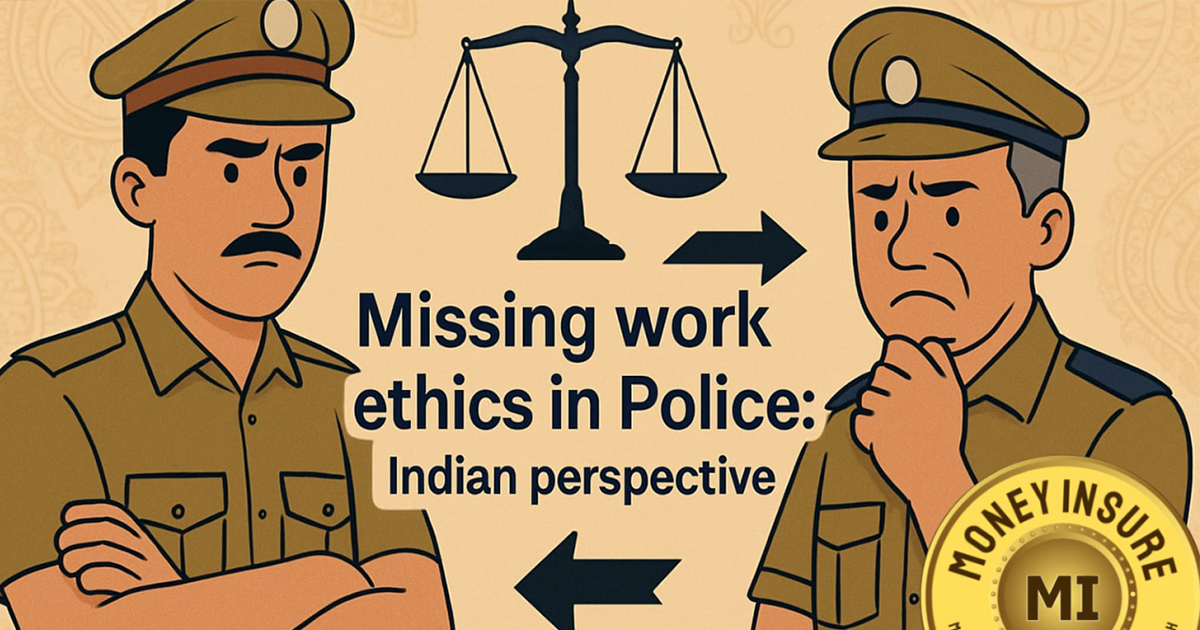Missing Work Ethics in Police: Indian Perspective
In a nation built on democratic ideals and rule of law, the police force plays a foundational role in ensuring justice, public order, and safety. However, the Indian Police System (IPS) often faces widespread criticism due to poor work ethics, corruption, lack of accountability, and political interference. This article aims to dissect the concept of work ethics in policing, analyze the causes behind its erosion in India, and explore viable reforms to reinstate public trust.
1. What are work ethics in Policing?
Work ethics refers to a set of moral principles and values that guide behavior and decision-making in the workplace. In the context of policing, work ethics encompass
- Integrity: Acting with honesty and moral uprightness.
- Accountability: Taking responsibility for actions and outcomes.
- Transparency: Openness in functioning and communication.
- Service Orientation: A commitment to public welfare.
- Non-Discrimination: Treating every citizen equally before the law.
In theory, Indian police personnel are bound by codes under the Police Act, 1861, Code of Criminal Procedure (CrPC), 1973 (now Bharatiya Nagarik Suraksha Sanhita (BNSS), 2023), and guidelines by the Supreme Court of India (SCI). Yet, in practice, these ethical values are frequently compromised.
2. Causes behind missing work ethics
Several interlinked factors contribute to the decline of work ethics in Indian police forces
a) Lack of Institutional Training
Though police academies exist at both central and state levels, ethical training is often inadequate or sidelined. Focus tends to be on hierarchy, physical rigor, and law enforcement rather than moral reasoning or public engagement.
b) Excessive Political Interference
Politicians frequently influence appointments, postings, investigations, and even legal outcomes, distorting the independence of the police force. This fosters a “yes-man” culture, undermining ethical integrity.
c) Poor working conditions
Low salaries, long working hours, lack of holidays, and unsupportive infrastructure lead to job dissatisfaction and unethical shortcuts.
d) Corruption and bribe culture
A study by Transparency International India (TII) in 2024 ranked police as among the top three most corrupt public institutions. Bribes often substitute standard operating procedures.
e) Performance pressure and arbitrary targets
Forcing police officers to show quick “results” often leads to fake encounters, coercion, and procedural violations.
f) Weak internal accountability
Internal mechanisms like vigilance departments or police complaints authorities either lack teeth or are themselves compromised. It is because Political bosses decide posting, transfers and promotions.
3. Consequences of declining work ethics
The impact of eroded work ethics in the police force is not just institutional, but deeply societal
a) Erosion of public trust
Trust in police, especially in rural areas and among minorities or vulnerable groups, remains dismal. According to a 2024 CSDS-Lokniti survey, only 38% of citizens believe that police act fairly.
b) Rise in custodial deaths
As per National Crime Records Bureau (NCRB) 2023 data, there were 146 custodial deaths, with less than 10% of police officers being convicted. In some cases, conviction was after more than 30 years.
c) Delayed justice
Manipulated investigations and tampered evidence prolong court cases, deny justice to victims, and overload the judiciary.
d) Selective policing
Bias on religious, caste, or economic lines often leads to unequal application of the law, feeding communal tensions and protests.
4. Lack of Political Will
Restoring ethical policing requires political will. Unfortunately, many governments exploit police for their own ends—suppressing opposition protests, silencing dissent, or protecting powerful offenders. The failure to implement police reforms as recommended by the Prakash Singh Case (2006), where the SCI issued seven directives, is a prime example of apathy or resistance by political elites.
5. How to set it right?
Corrective measures must be multi-pronged and institutionalized
a) Independent Police Complaints Authority (IPCA)
Every state must activate an IPCA to investigate misconduct cases without bias or political influence.
b) Transparent appointments & transfers
The Police Establishment Board (PEB) should handle postings and promotions based on merit and integrity.
c) Performance linked to ethics
Evaluate officers not just on cases solved, but also on community relations, fairness, and transparency.
d) Ethical training
Incorporate value education, conflict resolution, and empathy building into both induction and in-service training modules.
6. Community Policing as a long-term solution
Community Policing (CP) emphasizes collaboration between police and the public to proactively solve problems. It humanizes the force, instills accountability, and reduces the “us vs. them” sentiment.
Successful models like Janamaithri in Kerala, Maithri in Andhra Pradesh, and Meira Paibi collaborations in Manipur have demonstrated that when the police act as partners rather than enforcers, trust improves, and ethical behavior becomes inherent.
7. Judiciary’s Role
The Judiciary (JUD) can play a vital role in enforcing work ethics in the police:
- Mandating Reforms: Through PILs and suo motu cognizance, the SCI and High Courts have the power to direct reformative actions.
- Monitoring Custodial Deaths: Courts must ensure swift and strict punishment in cases of custodial torture or custodial rape.
- Strengthening Accountability: Encourage State Human Rights Commissions (SHRCs) to recommend action, and make their advice binding.
For instance, in Paramvir Singh Saini v. Baljit Singh (2020), the SCI directed all police stations to install CCTV cameras, ensuring transparency in interrogations.
Conclusion
India’s rise as a global power is not merely dependent on its GDP growth, digital economy, or geopolitical stance, but also on the integrity of its institutions. The police, as the first point of contact between the citizen and the state, must exhibit the highest ethical standards.
Missing work ethics is not just a flaw in the system—it is a symptom of larger rot: politicization, corruption, and societal disengagement. Reviving trust in the Indian Police System requires bold reforms, community participation, and an unyielding commitment to constitutional values.
Only then can the Indian police transform from an image of coercion to one of compassion, fairness, and justice—true protectors in both letter and spirit.
Abbreviations
| Abbreviation | Full Form |
| BNSS | Bharatiya Nagarik Suraksha Sanhita |
| CP | Community Policing |
| CrPC | Code of Criminal Procedure |
| GDP | Gross Domestic Product |
| IPCA | Independent Police Complaints Authority |
| IPS | Indian Police System/Service |
| NCRB | National Crime Records Bureau |
| PEB | Police Establishment Board |
| SCI | Supreme Court of India |
| SHRC | State Human Rights Commission |
| TII | Transparency International India |




